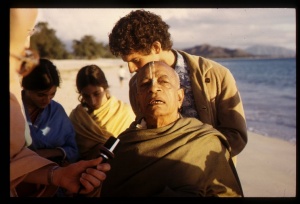CC Madhya 24.120: Difference between revisions
No edit summary |
(Vanibot #0054 edit - transform synonyms into clickable links, which search similar occurrences) |
||
| Line 19: | Line 19: | ||
<div class="synonyms"> | <div class="synonyms"> | ||
''akleśām'' | ''[//vanipedia.org/wiki/Special:VaniSearch?s=akleśām&tab=syno_o&ds=1 akleśām]'' — without material trouble; ''[//vanipedia.org/wiki/Special:VaniSearch?s=kamala&tab=syno_o&ds=1 kamala]-[//vanipedia.org/wiki/Special:VaniSearch?s=bhuvaḥ&tab=syno_o&ds=1 bhuvaḥ]'' — of Lord Brahmā, who took his birth from the lotus flower; ''[//vanipedia.org/wiki/Special:VaniSearch?s=praviśya&tab=syno_o&ds=1 praviśya]'' — entering; ''[//vanipedia.org/wiki/Special:VaniSearch?s=goṣṭhīm&tab=syno_o&ds=1 goṣṭhīm]'' — the association; ''[//vanipedia.org/wiki/Special:VaniSearch?s=kurvantaḥ&tab=syno_o&ds=1 kurvantaḥ]'' — continuously performing; ''[//vanipedia.org/wiki/Special:VaniSearch?s=śruti&tab=syno_o&ds=1 śruti]-[//vanipedia.org/wiki/Special:VaniSearch?s=śirasām&tab=syno_o&ds=1 śirasām]'' — of the topmost Vedic knowledge; ''[//vanipedia.org/wiki/Special:VaniSearch?s=śrutim&tab=syno_o&ds=1 śrutim]'' — hearing; ''[//vanipedia.org/wiki/Special:VaniSearch?s=śruta&tab=syno_o&ds=1 śruta]-[//vanipedia.org/wiki/Special:VaniSearch?s=jñāḥ&tab=syno_o&ds=1 jñāḥ]'' — who are expert in Vedic knowledge; ''[//vanipedia.org/wiki/Special:VaniSearch?s=uttuṅgam&tab=syno_o&ds=1 uttuṅgam]'' — very high; ''[//vanipedia.org/wiki/Special:VaniSearch?s=yadu&tab=syno_o&ds=1 yadu]-[//vanipedia.org/wiki/Special:VaniSearch?s=pura&tab=syno_o&ds=1 pura]-[//vanipedia.org/wiki/Special:VaniSearch?s=saṅgamāya&tab=syno_o&ds=1 saṅgamāya]'' — for going back home, back to Godhead, to Dvārakā; ''[//vanipedia.org/wiki/Special:VaniSearch?s=raṅgam&tab=syno_o&ds=1 raṅgam]'' — to Raṅga-kṣetra; ''[//vanipedia.org/wiki/Special:VaniSearch?s=yogī&tab=syno_o&ds=1 yogī]-[//vanipedia.org/wiki/Special:VaniSearch?s=indrāḥ&tab=syno_o&ds=1 indrāḥ]'' — great saintly persons; ''[//vanipedia.org/wiki/Special:VaniSearch?s=pulaka&tab=syno_o&ds=1 pulaka]-[//vanipedia.org/wiki/Special:VaniSearch?s=bhṛtaḥ&tab=syno_o&ds=1 bhṛtaḥ]'' — being spiritually pleased; ''[//vanipedia.org/wiki/Special:VaniSearch?s=nava&tab=syno_o&ds=1 nava]'' — nine; ''[//vanipedia.org/wiki/Special:VaniSearch?s=api&tab=syno_o&ds=1 api]'' — although; ''[//vanipedia.org/wiki/Special:VaniSearch?s=avāpuḥ&tab=syno_o&ds=1 avāpuḥ]'' — achieved. | ||
</div> | </div> | ||
Latest revision as of 23:01, 19 February 2024

A.C. Bhaktivedanta Swami Prabhupada
TEXT 120
- akleśāṁ kamala-bhuvaḥ praviśya goṣṭhīṁ
- kurvantaḥ śruti-śirasāṁ śrutiṁ śruta-jñāḥ
- uttuṅgaṁ yadu-pura-saṅgamāya raṅgaṁ
- yogīndrāḥ pulaka-bhṛto navāpy avāpuḥ
SYNONYMS
akleśām — without material trouble; kamala-bhuvaḥ — of Lord Brahmā, who took his birth from the lotus flower; praviśya — entering; goṣṭhīm — the association; kurvantaḥ — continuously performing; śruti-śirasām — of the topmost Vedic knowledge; śrutim — hearing; śruta-jñāḥ — who are expert in Vedic knowledge; uttuṅgam — very high; yadu-pura-saṅgamāya — for going back home, back to Godhead, to Dvārakā; raṅgam — to Raṅga-kṣetra; yogī-indrāḥ — great saintly persons; pulaka-bhṛtaḥ — being spiritually pleased; nava — nine; api — although; avāpuḥ — achieved.
TRANSLATION
"'The nine Yogendras entered Lord Brahmā’s association and heard from him the real meaning of the topmost Vedic literatures, the Upaniṣads. Although the Yogendras were already conversant in Vedic knowledge, they became very jubilant in Kṛṣṇa consciousness just by listening to Brahmā. Thus they wanted to enter Dvārakā, the abode of Lord Kṛṣṇa. In this way they finally achieved the place known as Raṅga-kṣetra.'
PURPORT
This is a quotation from the Mahā Upaniṣad.